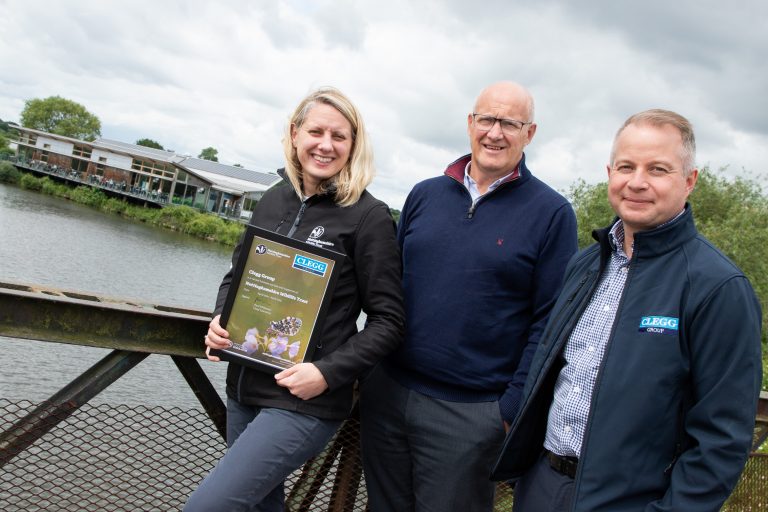Viridis Building Services Ltd has returned to sponsor the Sustainable Development of the Year category for a further year at the
East Midlands Bricks Awards 2024.
Growing your business by building greener, Viridis are experts in providing sustainable passive environmental building services solutions incorporating renewable, low carbon, low energy, H.V.A.C, M.E.P, systems for the built environment whilst meeting client’s aspirations, helping you create sustainable, appealing and cost-effective buildings on the journey to Net Zero.

Speaking with Business Link, a spokesperson for Viridis Building Services Ltd said: “Viridis are proud to sponsor the Sustainable Development of the Year award for another year. We have promoted this award for the past few years due to our own values as a team and how these fits in with those.
“It allows us the opportunity to review innovative ideas, solutions, and developments in and around the East Midlands. We are passionate about sustainability and are proud to see that others have the same ethos as ourselves with their entries.
“We believe being involved in this award allows us to further promote these pragmatic design solutions to create new relationships to present to others what can be done – to hopefully create an even more innovative sustainable future through places and spaces.
“We are excited to see this year’s entries, as we are every year, and look forward to presenting the winner of this award. We feel that the Bricks is an opportunity to bring everyone in the area together to celebrate our achievements and promote our works to create a bigger and better East Midlands.”
The East Midlands Bricks Awards, which will take place on
Thursday 3rd October, at the Trent Bridge Cricket Ground, recognise development projects and people in commercial and public building across the region – from office, industrial and residential, through to community projects such as leisure schemes, schools and public spaces. We also highlight the work of architects, agencies and those behind large schemes.
Winning one of these awards will add considerably to a company’s or individual’s brand and enhance their commercial reach significantly.
To nominate your (or another) business/development for one of our awards, please click on a category link below or visit this page.
Award categories include:
Nominations end Thursday 5th September

A highlight in the business calendar, winners will be revealed at a glittering awards ceremony on
Thursday 3rd October, at the Trent Bridge Cricket Ground – an evening of celebration and networking with property and construction leaders from across the region.
Tickets can be booked for the 2024 awards event
here. Connect with local decision makers over nibbles and complimentary drinks while applauding the outstanding companies and projects in our region.
Attendees will also hear from keynote speaker
Paul Southby, partner at Geldards LLP, chair of the Advisory Board to Nottingham Business School, chair of Broadway independent cinema, trustee of Clean Rivers Trust, chair of Nottingham Partners, board member of Marketing Nottingham and Nottinghamshire, and former High Sheriff of Nottinghamshire.
Thanks to our sponsors:











To be held at:

 The mill complex was originally built as the Farnsworth Bleach Works in the 17th century, it has been used for various business over the years; most recently a printing business.
The remaining outbuildings would become commercial and business premises, adding a dynamic dimension to the revitalisation of the area. Matthew Montague said: “Because the buildings are in a varying state of disrepair and lack modern facilities, they are basically not viable for ongoing commercial use.
“With considered design the new development will fund the restoration of important historic structures and ensure the long-term preservation of the site, whilst providing great new facilities for business to work from.”
He concluded: “It’s a fantastic site, that is significant to the county’s history. We are delighted to be involved with its evolution and to help develop and preserve it for the next hundred years.”
A decision on the comprehensive scheme is expected from the district council in the coming months.
The mill complex was originally built as the Farnsworth Bleach Works in the 17th century, it has been used for various business over the years; most recently a printing business.
The remaining outbuildings would become commercial and business premises, adding a dynamic dimension to the revitalisation of the area. Matthew Montague said: “Because the buildings are in a varying state of disrepair and lack modern facilities, they are basically not viable for ongoing commercial use.
“With considered design the new development will fund the restoration of important historic structures and ensure the long-term preservation of the site, whilst providing great new facilities for business to work from.”
He concluded: “It’s a fantastic site, that is significant to the county’s history. We are delighted to be involved with its evolution and to help develop and preserve it for the next hundred years.”
A decision on the comprehensive scheme is expected from the district council in the coming months.












 Speaking with Business Link, a spokesperson for Viridis Building Services Ltd said: “Viridis are proud to sponsor the Sustainable Development of the Year award for another year. We have promoted this award for the past few years due to our own values as a team and how these fits in with those.
“It allows us the opportunity to review innovative ideas, solutions, and developments in and around the East Midlands. We are passionate about sustainability and are proud to see that others have the same ethos as ourselves with their entries.
“We believe being involved in this award allows us to further promote these pragmatic design solutions to create new relationships to present to others what can be done – to hopefully create an even more innovative sustainable future through places and spaces.
“We are excited to see this year’s entries, as we are every year, and look forward to presenting the winner of this award. We feel that the Bricks is an opportunity to bring everyone in the area together to celebrate our achievements and promote our works to create a bigger and better East Midlands.”
The East Midlands Bricks Awards, which will take place on Thursday 3rd October, at the Trent Bridge Cricket Ground, recognise development projects and people in commercial and public building across the region – from office, industrial and residential, through to community projects such as leisure schemes, schools and public spaces. We also highlight the work of architects, agencies and those behind large schemes.
Winning one of these awards will add considerably to a company’s or individual’s brand and enhance their commercial reach significantly.
To nominate your (or another) business/development for one of our awards, please click on a category link below or visit
Speaking with Business Link, a spokesperson for Viridis Building Services Ltd said: “Viridis are proud to sponsor the Sustainable Development of the Year award for another year. We have promoted this award for the past few years due to our own values as a team and how these fits in with those.
“It allows us the opportunity to review innovative ideas, solutions, and developments in and around the East Midlands. We are passionate about sustainability and are proud to see that others have the same ethos as ourselves with their entries.
“We believe being involved in this award allows us to further promote these pragmatic design solutions to create new relationships to present to others what can be done – to hopefully create an even more innovative sustainable future through places and spaces.
“We are excited to see this year’s entries, as we are every year, and look forward to presenting the winner of this award. We feel that the Bricks is an opportunity to bring everyone in the area together to celebrate our achievements and promote our works to create a bigger and better East Midlands.”
The East Midlands Bricks Awards, which will take place on Thursday 3rd October, at the Trent Bridge Cricket Ground, recognise development projects and people in commercial and public building across the region – from office, industrial and residential, through to community projects such as leisure schemes, schools and public spaces. We also highlight the work of architects, agencies and those behind large schemes.
Winning one of these awards will add considerably to a company’s or individual’s brand and enhance their commercial reach significantly.
To nominate your (or another) business/development for one of our awards, please click on a category link below or visit  A highlight in the business calendar, winners will be revealed at a glittering awards ceremony on Thursday 3rd October, at the Trent Bridge Cricket Ground – an evening of celebration and networking with property and construction leaders from across the region.
Tickets can be booked for the 2024 awards event
A highlight in the business calendar, winners will be revealed at a glittering awards ceremony on Thursday 3rd October, at the Trent Bridge Cricket Ground – an evening of celebration and networking with property and construction leaders from across the region.
Tickets can be booked for the 2024 awards event 












